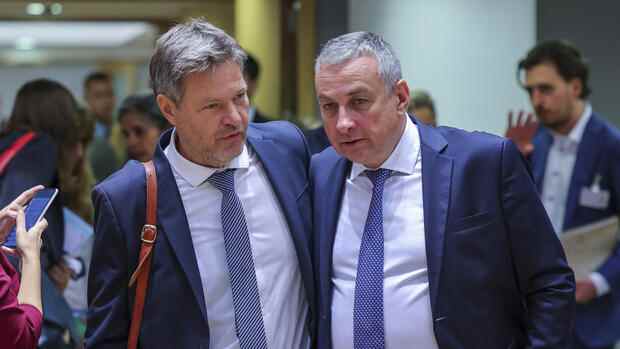Brussels The European energy ministers are not yet satisfied with the EU Commission’s proposals for an emergency plan. Furthermore, some of the ministers are pushing for a gas price cap, as there is in Spain and Portugal. The demand can even be found in the final document of the meeting. The measure is intended to help limit the impact of high gas prices on the EU electricity markets.
Some states and the EU Commission consider the idea to be unworkable. Capping the price of gas would cost a lot of money, reduce incentives to save, and have many other unintended effects.
In Spain, for example, coal-fired power plants were pushed out of the market and could only be brought back into production with subsidies. Applied to the whole of Europe, the well-established market mechanisms for cross-border electricity trading could get mixed up, say experts.
But despite such warnings, some governments refuse to be dissuaded from the idea. In particular, the Czech Energy Minister Jozef Sikela continues to demand a gas price cap. Since the Czech Republic currently holds the Council Presidency, it was its people who wrote the final document of the ministerial meeting.
Top jobs of the day
Find the best jobs now and
be notified by email.
The EU Commission is now faced with the task of complying with the ministers’ request, although it has clearly rejected the idea of a price cap in earlier papers.
Commission President Ursula von der Leyen had suggested another way to push down the gas price. She wanted EU countries to agree on a price limit for Russian gas only. That’s been suggested by economists for months, but it’s risky. As a result, Russia could stop deliveries altogether, European buyers fear.
>> Read here: “Limiting Putin’s revenue” – That’s von der Leyen’s five-point plan for the gas crisis
Accordingly, the idea was practically buried at the ministerial meeting. Federal Minister of Economics Robert Habeck (Greens) said that such a decision must be left to those countries that still get gas from Russia.
This means countries like Austria, the Czech Republic, Slovakia and Hungary. They also have difficulty getting rid of Russian gas because they have no coasts and therefore no LNG terminals of their own to replace pipeline gas from Russia.
Ministerial round for liquidity support on a larger scale
The energy ministers agreed that liquidity support should be possible on a larger scale. A savings target for electricity is also likely to be launched.
The hopes of falling electricity prices continue to lie in a market intervention for which the EU Commission intends to present a proposal next Tuesday. The states want to have agreed on the details by the end of September.
Habeck insists on influencing pricing in the market in such a way that the electricity price does not rise too much even if part of the electricity is produced with gas.
This could happen if the EU sets a limit for electricity. In an early draft of the corresponding law, there was talk of 200 euros per megawatt hour. Only gas-fired power plants would then be able to demand more because they have particularly high costs.
Habeck does not want a fixed limit, but to define the value for different power generators individually. He spoke of a “staircase” that would define the prices.
>> Read here: Signs of isolation – EU countries do not trust each other when it comes to gas issues
Whether this market intervention is technically feasible remains to be seen. Industry representatives warn of a collapse in trade if the instrument is misdesigned.
Has the Commission overlooked a massive problem?
The biggest problem is that much of the electricity is not traded on exchanges, but through long-term contracts between producers, traders and consumers. The prices for this are fixed for years, while they fluctuate every 15 minutes on the electricity exchanges.
These differences could lead to sales being skimmed off that actually never existed. “The Commission may have simply overlooked a massive problem so far,” said power market expert Lion Hirth to Handelsblatt.
The EU Commission could also only intervene in the profits afterwards. Habeck described this as the second best option. If there is no European solution at all, he still reserves the right to only intervene in the market in Germany.
At the same time, he made it clear that such interventions are risky: “We are changing a market system that has been built up over decades, is highly complex and has repeatedly been optimized for robustness.” Normally, this is a project for an entire legislative period, now the project should be in a few weeks to be completed.
More: “Overlooking a massive problem” – EU plans for the electricity market endanger energy suppliers
